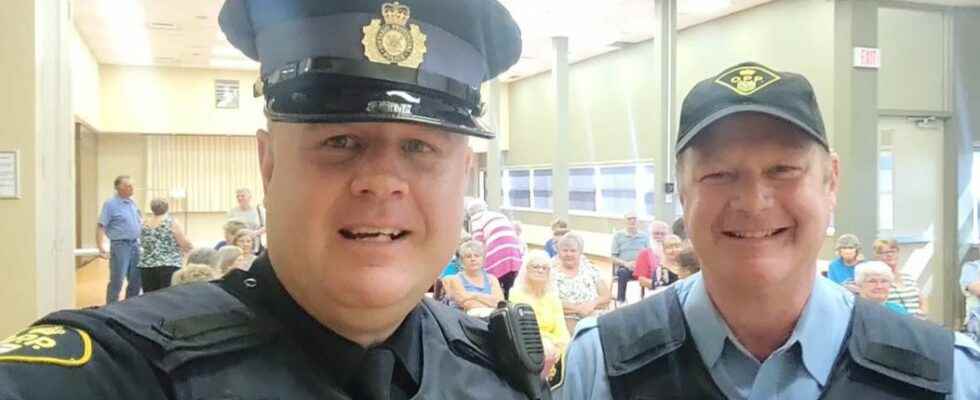
Lots of people dream of owning a boat. For some it’s a canoe. For others it may be a yacht. For many, it’s something in between.
Earlier this summer, a Norfolk resident tried to buy a boat that was listed for sale online.
In the end, the person was out $500, didn’t receive the boat and contacted Norfolk OPP to report the suspected fraud.
The incident prompted Norfolk OPP Const. Ed Sanchuk to send out a reminder of how to protect yourself against fraud.
To help inform the public about fraud prevention, the OPP fraud unit and community safety services have gone a step further by creating an in-person anti-fraud program.
“This is just a great opportunity to educate the community and prevent victims of fraud from happening across the province,” said Sanchuk.
The program involves an Ontario Provincial Police officer teaming up with an auxiliary officer to deliver the “fight fraud” program. To date, 70 OPP auxiliary officers have been trained to offer the sessions across the province.
Sanchuk and Norfolk OPP Auxiliary Sgt. Brad Wiersma teamed up for a recent presentation at the Simcoe Seniors Centre.
“People are tired of getting fraudulent phone calls and being defrauded by scammers,” said Sanchuk.
There has been an increase in fraud throughout the county with some people not reporting the incidents due to feelings of embarrassment, he said.
“We want to make sure that people understand if they had a fraud occur to them or attempted fraud, they can contact their local police authority as well as the Canadian Anti-Fraud Centre,” Sanchuk said.
That’s a message echoed by Wiersma.
“There is not one person in any of these presentations that we have done that has not had a personal experience with some sort of scam or phone call,” he said in an online video.
“What we are trying to do is build a conversation and let people know, first of all, that if you have been a victim, to try to take the stigma away, it can happen to anyone.”
Wiersma said another goal of the program is to give people the building blocks to identify red flags of a possible scam.
The presentations cover various topics, such as types of frauds, thefts, securing vehicles to prevent break-ins and other safety and protection issues.
Sanchuk said some of the most common fraud cases in the county are romance scams where a victim may be contacted by a stranger on social media who will foster their love over time and eventually start asking for more money through gaining the victim’s trust.
Wiersma said the presentations have been well received.
“Several people were asking how they can get another program and how they can get family or friends to listen to the exact same content,” he said.
To book a presentation for a large group in Norfolk call the OPP detachment at 519-426-3434 or call 1-888-310-1122.
More information on fraud prevention is available at Canadian Anti-Fraud Center at 1-888-495-8501 or http://www.antifraudcentre.ca.
Tips to avoid being a victim of a romance/dating scam
- Check website addresses carefully. Scammers often set up fake websites with very similar addresses to legitimate dating websites. Make sure you only use legitimate and reputable dating websites.
- Never send money or give credit card or online account details to anyone you do not know and trust. A request to send money to a foreign country using e-transfers or a money transfer service to a person you have never personally met should be a red flag.
- Don’t give out any personal information in an email or when you are chatting online. Like any scam, use your computer to your advantage. Educate yourself. Check the person’s name, the company name, the addresses used, and ask yourself, “Would this be normal?”
- Ask yourself: “Would someone I have never met really declare their love for me after only a few letters or emails or phone calls?”
SOURCE: NORFOLK OPP
BUYER BEWARE
Know whom you are dealing with – independently confirm your seller’s name, street, address, and telephone number.
Resist pressure to “act now.” If an offer sounds too good to be true it usually is.
If the buyer wants to use a service you have not heard of, be sure to check it out to be sure it is reliable – check its Web site, call its customer service hotline, and read its terms of agreement and privacy policy. If you do not feel comfortable with the service, do not use it.
Never wire money or use a bank-to-bank transfer in a transaction.
Always try to deal locally when buying or selling anything.
Do not sell or buy any item from someone who is unable or unwilling to meet you face to face in a public place.
Never buy anything that you have not seen in real life and had inspected by a professional.
SOURCE: NORFOLK OPP
